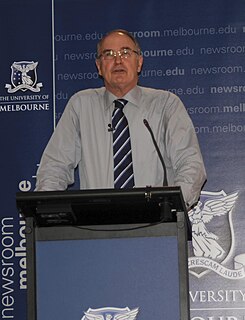
Robert James Lee Hawke was an Australian politician who served as the 23rd prime minister of Australia from 1983 to 1991, holding office as the leader of the Australian Labor Party (ALP).

Paul John Keating is an Australian former politician who served as the 24th prime minister of Australia from 1991 to 1996. A member of the Australian Labor Party (ALP), he previously served as treasurer of Australia in the Hawke Government from 1983 to 1991 and as deputy prime minister of Australia from 1990 to 1991.

The prime minister of Australia is the head of government of the Commonwealth of Australia. The prime minister heads the executive branch of the federal government of Australia and is also accountable to federal parliament under the principles of responsible government. The incumbent prime minister is Scott Morrison, who took office in 2018 as leader of the Liberal Party.

John Charles Kerin is an Australian economist and former Labor Party politician who served in the House of Representatives from 1972 to 1975 and again from 1978 to 1993. He held a number of senior ministerial roles in both the Hawke and Keating Governments, including six months as Treasurer of Australia and eight years as Minister for Primary Industries and Energy, holding the latter role for the longest period in Australian history.
John Owen Stone is a former Australian public servant and politician. He served as Secretary to the Treasury between 1979 and 1984, and as a senator for Queensland, representing the National Party, from 1987 to 1990.

Neal Blewett, AC is an Australian Labor Party politician and diplomat. He was the Member of the House of Representatives for Bonython from 1977 to 1994. He served in both the Hawke and Keating Governments, notably in the former as Minister for Health from 1983 to 1991, during which time he oversaw the Government's reaction to HIV/AIDS. After retiring from Parliament in 1994, he was appointed High Commissioner to the United Kingdom, a role he held until 1998.

Ross Gregory Garnaut is an Australian economist, currently serving as a vice-chancellor's fellow and professorial fellow of economics at the University of Melbourne. He is the author of numerous publications in scholarly journals on international economics, public finance and economic development, particularly in relation to East Asia and the Southwest Pacific.

The Hawke–Keating government is an all-encompassing term to describe the duration of the Hawke government and the Keating government, which together spanned from 11 March 1983 to 11 March 1996. Both governments were formed by the Australian Labor Party, and were led from 1983 to 1991 by Bob Hawke as Prime Minister, and from 1991 to 1996 by Paul Keating as Prime Minister, with Keating serving as Treasurer throughout the Hawke government. During the Hawke–Keating government, the Labor Party won five successive federal elections, its most electorally successful period to date; the 13-year uninterrupted period of government also remains the Labor Party's longest spell in power at the federal level.

The Hawke government was the federal executive government of Australia led by Prime Minister Bob Hawke of the Australian Labor Party (ALP) from 1983 to 1991. The government followed the Liberal-National Coalition Fraser government and was succeeded by another Labor administration, the Keating government, led by Paul Keating after an internal party leadership challenge in 1991. Keating served as Treasurer through much of Hawke's term as Prime Minister and the period is sometimes termed the Hawke-Keating government.
Michael John Costello is a former senior Australian public servant and chief of staff to former Australian Labor Party politician Kim Beazley during Beazley's tenure as Leader of the Opposition from 1996 to 2001.
Allan Douglas Hawke, is a former Australian senior public servant and diplomat.
Helen Rodda Williams is a retired Australian senior public servant. She was the first woman in the Australian Public Service to be appointed as a Secretary of an Australian government department.
Derek Volker, is a retired senior Australian public servant.
David Marcus Rosalky is an Academic and a retired senior Australian public servant. He is currently a visiting fellow at the Crawford School of Economics and Government at the Australian National University in Canberra.
Michael Henry Codd is a retired Australian senior public servant.
Edward Alfred Evans was an Australian senior public servant and economist. From 1993 to 2001, he was Secretary of the Department of the Treasury.
Dr Donald Russell is a former senior Australian public servant and administrator. He is currently the Chairman of AustralianSuper, Australia's largest superannuation fund.
Stephen Thomas Sedgwick, is a retired senior Australian public servant. He is best known for his time as Australian Public Service Commissioner between 2009 and 2014, and for his prior appointments as secretary of various departments in the Australian Public Service.
William Allan McKinnon was a senior Australian public servant. He was Secretary of the Department of Immigration and Ethnic Affairs between 1983 and 1987.
Christopher Ian Higgins was a senior Australian public servant and economist. He was Secretary of the Department of the Treasury from September 1989 until his death.





